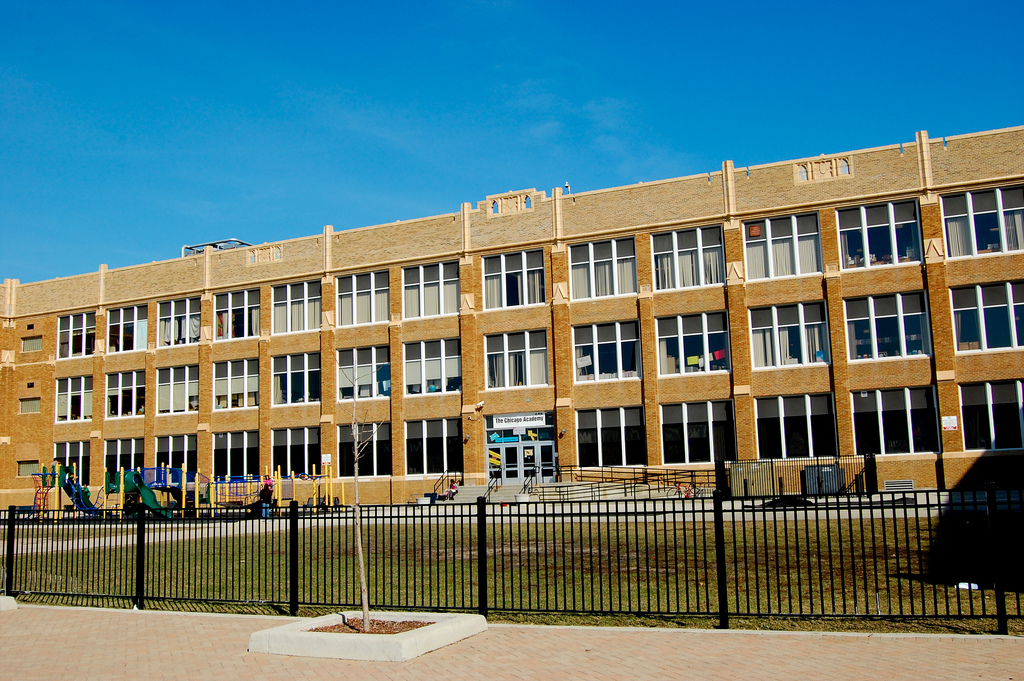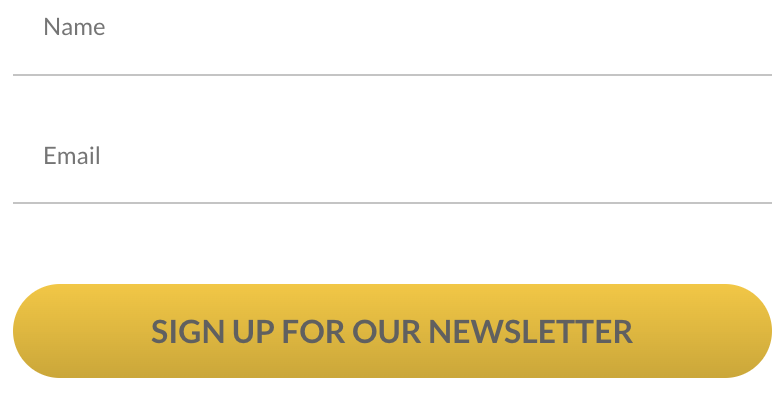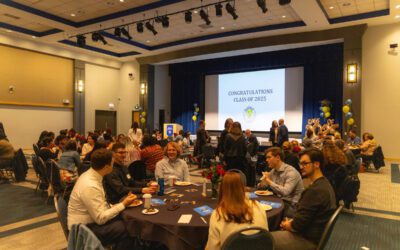[vc_row][vc_column][stm_title title_tag=”h3″ title=”Chicago Academy Leaders Reflect on Preparing for This School Year”]Setting the Foundation for All Staff to Engage Productively in SchoolsSetting the Foundation for All Staff to Engage Productively in Schools[/stm_title][vc_row_inner][vc_column_inner width=”1/2″][vc_single_image image=”6616″ img_size=”large”][vc_column_text]Principal Laughlin from The Chicago Academy (TCA).[/vc_column_text][/vc_column_inner][vc_column_inner width=”1/2″][vc_column_text]When did planning for this school year start? Who was involved and what did that consist of?
In March 2018, our CIWP (Continuous Improvement Work Planning) team of teachers analyzed our school needs and goals in order to determine focus areas for the upcoming year. From this big picture view, we continued the planning work around how we could capitalize on what we’ve accomplished as a school thus far. The collaboration time with fellow principals during principal collaboratives (dedicated principal professional development communities) was a great way for us to reflect on our school’s strengths and areas for growth, and then plan our way to move forward. [/vc_column_text][/vc_column_inner][/vc_row_inner][vc_message message_box_style=”outline” style=”square” message_box_color=”blue” icon_type=”linecons” icon_linecons=”vc_li vc_li-search”]Principal Collaboratives, managed by our Directors of School Leadership (e.g., principal managers/coaches) work regularly to bring together and deepen principals’ knowledge and practice around key focus areas of upcoming content through coaching and cross-principal collaboration so they can better support their teams. Learn more about these as well as other professional learning spaces in the AUSL network here.[/vc_message][vc_column_text]Also important was bringing in the voices of our own teacher leaders to hear their perspective and create investment among staff. Starting early and continually reviewing our data allowed us to be proactive in tackling the upcoming year so that we can reach higher levels of success with our students.[/vc_column_text][vc_row_inner][vc_column_inner width=”1/2″][vc_column_text]What are your priorities for the school year this year? How do these differ or build on last year?
We want to capitalize on the content knowledge we’ve built among teachers at our school. We’ve studied the curriculum and standards to clarify the intended learning outcomes for students, and we’ve learned how the curriculum facilitates a path toward those outcomes. This year, we want to move forward from this point to build school-wide capacity in responsive instruction for all our learners.
In being responsive, we need to make sure we don’t lose sight of the expectations for student learning outcomes.[/vc_column_text][/vc_column_inner][vc_column_inner width=”1/2″][vc_single_image image=”6614″ img_size=”large”][vc_column_text]Assistant Principal Pae from The Chicago Academy (TCA).[/vc_column_text][/vc_column_inner][/vc_row_inner][vc_message message_box_style=”outline” style=”square” message_box_color=”blue” icon_type=”linecons” icon_linecons=”vc_li vc_li-search”]AUSL identified, adopted, and adapted a unified, guaranteed and viable curricular resource and assessment approach, called Engage AUSL. Our implementation and adaptation of Engage AUSL has set the table for teachers from the beginning of each school year, giving them space to focus on elevating their teaching practice. Learn more about our implementation of this resource here and how it supports our leaders and teachers here.[/vc_message][vc_column_text]Responsive teaching for us is aimed at ensuring we empower all students with agency to drive learning forward in our classrooms so they can gain new knowledge and skills. The teaching practices we believe are highest leverage with respect to responsive instruction, and that complement our current knowledge of the curriculum, are academic discussion and formative assessment. Discussion includes creating opportunities for students to share what they think and what they are learning, and formative assessment comes through teachers listening in on student thinking and analyzing student work during instruction so they can make informed decisions about what to address in the moment to further student learning. We believe building these practices for teachers across classrooms will put students in the driver’s seat so they can lead more of the learning that takes place.[/vc_column_text][vc_column_text]Upon reflection, where do you wish you’d spent more time preparing?
We think right now, and each day, it’s important for us to reflect on where we are currently so we can further develop teacher practices and, thereby, enhance student learning outcomes. We don’t think we necessarily needed to spend more time on any specific component in preparing for this year, but we do think we are now seeing that it’s important for us to continually calibrate and refine our approach to teacher coaching so we can help our teachers consistently be at their best for their students. It’s important that we keep a pulse on this as we observe instruction, and then develop the right next steps to support teachers in building their capacity.
What do you think is going to pose the biggest challenge this year?
Continuous improvement is a constant theme for us and our teachers. Every teacher is unique, and so our support to our teachers needs to match their needs as it pertains to our instructional priorities. We want all teachers to build or refine their practices in being responsive to the students they serve so they can lead them towards mastering standards. While we recognize this responsive teaching is already happening in places within our building, we want to make sure these best practices extend across all classrooms. Sustaining momentum in this area requires a nuanced approach so that we are helping each teacher develop regardless of grade level taught, years of experience, and content area. We want to be thoughtful and strategic in our feedback so it aligns to our focus areas and ultimately supports teachers in helping our students learn at an even deeper level.[/vc_column_text][vc_message message_box_style=”outline” style=”square” message_box_color=”blue” icon_type=”linecons” icon_linecons=”vc_li vc_li-search”]Learn more about AUSL’s approach to continuous improvement here.[/vc_message][vc_column_text]What are you most excited about as you look forward?
We are excited about creating more transparent structures to enhance our multi-tiered system of support for all students. This means we are monitoring students across grade levels so all students get the supports they deserve to reach high levels of success. One aspect we are building across our school is social-emotional instruction for all our students. This is done through a new initiative launched this year with Second Step as our curricular resource. We hope this complements our focus over the past few years on restorative approaches to discipline. Restorative approaches to discipline focus on rehabilitating students that cause harm through behaviors, and helping them get back on track and do better. It strays from punitive consequences and incorporates self-reflection and community building. Instead of students that comply with rules and avoid getting consequences, we hope we can cultivate lifelong learners that act with integrity for the betterment of the entire school community. This doesn’t happen overnight, and we recognize that, but we’re excited about the steps we’re taking this year to continue to make progress towards creating this environment as a hallmark of the TCA school experience. [/vc_column_text][/vc_column][/vc_row][vc_row][vc_column width=”1/4″][stm_btn_simple btn_style=”flat” btn_alignment=”center” btn_link=”url:http%3A%2F%2Fwww.auslchicago.org%2Fblog%2F|||” btn_link_text=”Return to Blog”][/vc_column][vc_column width=”1/4″][stm_btn_simple btn_style=”flat” btn_alignment=”center” btn_link=”url:http%3A%2F%2Fwww.auslchicago.org%2Fausl-advisory-services%2F|||” btn_link_text=”Advisory Services”][/vc_column][vc_column width=”1/4″][stm_btn_simple btn_style=”flat” btn_alignment=”center” btn_link=”url:http%3A%2F%2Fwww.auslchicago.org%2Fdonate%2F|||” btn_link_text=”Donate”][/vc_column][vc_column width=”1/4″][stm_btn_simple btn_style=”flat” btn_alignment=”center” btn_link=”url:http%3A%2F%2Fwww.auslchicago.org%2Fabout%2Fimpact-through-innovation%2F|||” btn_link_text=”Innovation Zone”][/vc_column][/vc_row][vc_row][vc_column][/vc_column][/vc_row]
















